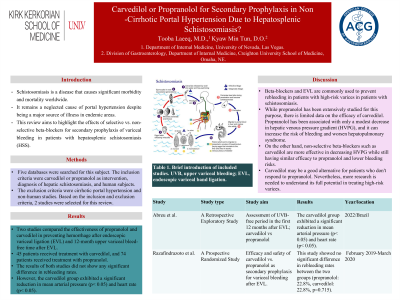Monday Poster Session
Category: Liver
P2898 - Carvedilol or Propranolol for Secondary Prophylaxis in Non-Cirrhotic Portal Hypertension Due to Hepatosplenic Schistosomiasis?
Monday, October 28, 2024
10:30 AM - 4:00 PM ET
Location: Exhibit Hall E

Has Audio
- TL
Tooba Laeeq, MD
University of Nevada
Las Vegas, NV
Presenting Author(s)
Tooba Laeeq, MD1, Kyaw Min Tun, DO2
1University of Nevada, Las Vegas, NV; 2Creighton University School of Medicine, Las Vegas, NV
Introduction: Schistosomiasis is a disease that causes significant morbidity and mortality worldwide. It remains a neglected cause of portal hypertension despite being a major source of illness in endemic areas. This scoping review aims to highlight the effects of selective vs. non-selective beta-blockers for secondary prophylaxis of variceal bleeding in patients with hepatosplenic schistosomiasis (HSS).
Methods: Five databases were searched for this subject. The inclusion criteria were carvedilol or propranolol as intervention, diagnosis of hepatic schistosomiasis, and human subjects. The exclusion criteria were cirrhotic portal hypertension and non-human studies. Based on the inclusion and exclusion criteria, 2 studies were selected for this scoping review.
Results: Two studies compared the effectiveness of propranolol and carvedilol in preventing hemorrhage after endoscopic variceal ligation (EVL) and 12-month upper variceal bleed-free time after EVL. 45 patients received treatment with carvedilol and 74 patients received treatment with propranolol. The results of both studies did not show any significant difference in rebleeding rates. However, the carvedilol group exhibited a significant reduction in mean arterial pressure (p< 0.05) and heart rate (p< 0.05).
Discussion: Beta-blockers and EVL are commonly used to prevent rebleeding in patients with high-risk varices in patients with schistosomiasis. While propranolol has been extensively studied for this purpose, there is limited data on the efficacy of carvedilol. Propranolol has been associated with only a modest decrease in HVPG, and it can increase the risk of bleeding and worsen hepatopulmonary syndrome. On the other hand, non-selective beta-blockers such as carvedilol are more effective in decreasing HVPG while still having similar efficacy to propranolol and lower bleeding risks. As such, carvedilol may be a good alternative for patients who don't respond to propranolol. Nevertheless, more research is needed to understand the full potential of carvedilol in treating high-risk varices.
Note: The table for this abstract can be viewed in the ePoster Gallery section of the ACG 2024 ePoster Site or in The American Journal of Gastroenterology's abstract supplement issue, both of which will be available starting October 27, 2024.
Disclosures:
Tooba Laeeq, MD1, Kyaw Min Tun, DO2. P2898 - Carvedilol or Propranolol for Secondary Prophylaxis in Non-Cirrhotic Portal Hypertension Due to Hepatosplenic Schistosomiasis?, ACG 2024 Annual Scientific Meeting Abstracts. Philadelphia, PA: American College of Gastroenterology.
1University of Nevada, Las Vegas, NV; 2Creighton University School of Medicine, Las Vegas, NV
Introduction: Schistosomiasis is a disease that causes significant morbidity and mortality worldwide. It remains a neglected cause of portal hypertension despite being a major source of illness in endemic areas. This scoping review aims to highlight the effects of selective vs. non-selective beta-blockers for secondary prophylaxis of variceal bleeding in patients with hepatosplenic schistosomiasis (HSS).
Methods: Five databases were searched for this subject. The inclusion criteria were carvedilol or propranolol as intervention, diagnosis of hepatic schistosomiasis, and human subjects. The exclusion criteria were cirrhotic portal hypertension and non-human studies. Based on the inclusion and exclusion criteria, 2 studies were selected for this scoping review.
Results: Two studies compared the effectiveness of propranolol and carvedilol in preventing hemorrhage after endoscopic variceal ligation (EVL) and 12-month upper variceal bleed-free time after EVL. 45 patients received treatment with carvedilol and 74 patients received treatment with propranolol. The results of both studies did not show any significant difference in rebleeding rates. However, the carvedilol group exhibited a significant reduction in mean arterial pressure (p< 0.05) and heart rate (p< 0.05).
Discussion: Beta-blockers and EVL are commonly used to prevent rebleeding in patients with high-risk varices in patients with schistosomiasis. While propranolol has been extensively studied for this purpose, there is limited data on the efficacy of carvedilol. Propranolol has been associated with only a modest decrease in HVPG, and it can increase the risk of bleeding and worsen hepatopulmonary syndrome. On the other hand, non-selective beta-blockers such as carvedilol are more effective in decreasing HVPG while still having similar efficacy to propranolol and lower bleeding risks. As such, carvedilol may be a good alternative for patients who don't respond to propranolol. Nevertheless, more research is needed to understand the full potential of carvedilol in treating high-risk varices.
Note: The table for this abstract can be viewed in the ePoster Gallery section of the ACG 2024 ePoster Site or in The American Journal of Gastroenterology's abstract supplement issue, both of which will be available starting October 27, 2024.
Disclosures:
Tooba Laeeq indicated no relevant financial relationships.
Kyaw Min Tun indicated no relevant financial relationships.
Tooba Laeeq, MD1, Kyaw Min Tun, DO2. P2898 - Carvedilol or Propranolol for Secondary Prophylaxis in Non-Cirrhotic Portal Hypertension Due to Hepatosplenic Schistosomiasis?, ACG 2024 Annual Scientific Meeting Abstracts. Philadelphia, PA: American College of Gastroenterology.

